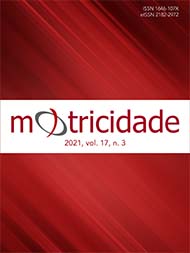Instrumentos de avaliação de crianças no meio aquático: uma revisão sistemática
DOI:
https://doi.org/10.6063/motricidade.21586Palabras clave:
Ensino, Competência Aquática, AvaliaçãoResumen
Objetivou-se identificar e descrever instrumentos referentes à avaliação do comportamento aquático de crianças, por meio de revisão sistemática, e discuti-los à luz do conceito de competência aquática. Realizou-se a busca nas bases SPORTDiscus with Full Text, MEDLINE Complete, EMBASE, Web of Science e PubMed. Foram incluídos artigos, teses e dissertações em língua portuguesa, inglesa, espanhola e francesa, sem restrição quanto ao ano e tipo de estudo. A estratégia de busca encontrou 14.099 estudos e 62 foram considerados elegíveis. Identificaram-se 21 instrumentos para crianças sem deficiência e estes incluem, predominantemente, tarefas relacionadas à natação propriamente dita e utilizam a qualidade da execução da tarefa como critério de avaliação. Identificaram-se também 15 instrumentos para crianças com deficiência. Estes incluem, predominantemente, tarefas relacionadas à adaptação ao meio aquático e utilizam o nível de autonomia na execução da tarefa como critério de avaliação. Ressalta-se que para ser competente na água uma criança deve saber executar tarefas de diferentes esportes aquáticos e ser capaz de aplicá-las em ambientes com características distintas. Nesse caso, os instrumentos de avaliação encontrados se mostraram limitados. A partir da problematização realizada percebeu-se a urgência de discutir o conceito de competência aquática para qualificar programas de ensino do nadar.
Palavras-chave: ensino; competência aquática; avaliação.
Descargas
Publicado
Número
Sección
Licencia
The authors of submitted manuscripts must transfer the full copyright to Journal Motricidade / Sílabas Didáticas Editions. Granting copyright permission allows the publication and dissemination of the article in printed or electronic formats, and copyrights start at the moment the manuscript is accepted for publication. It also allows Journal Motricidade to use and commercialise the article in terms of licensing, lending or selling its content to indexation/abstracts databases and other entities.
According to the terms of the Creative Commons licence, authors may reproduce a reasonable number of copies for personal or professional purposes, but without any economic gain. SHERPA/RoMEO allows authors to post a final digital copy (post-printing version) of the article on their websites or on their institutions' scientific repository.


